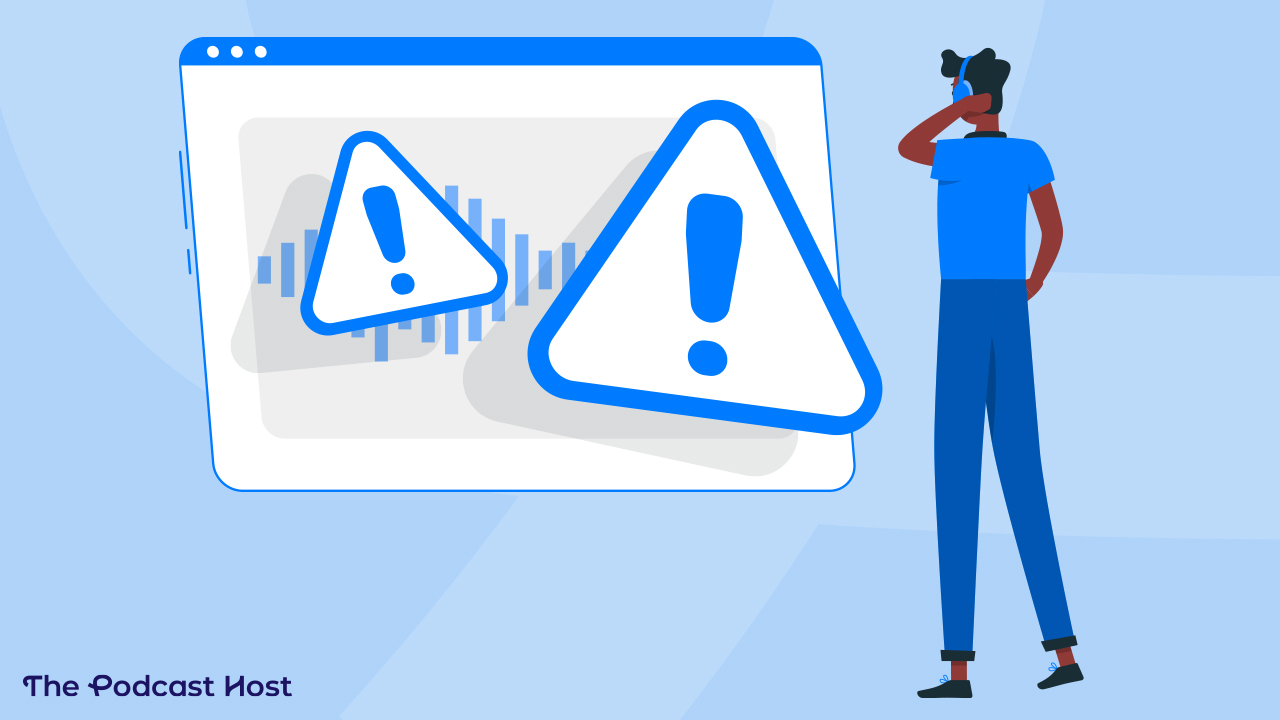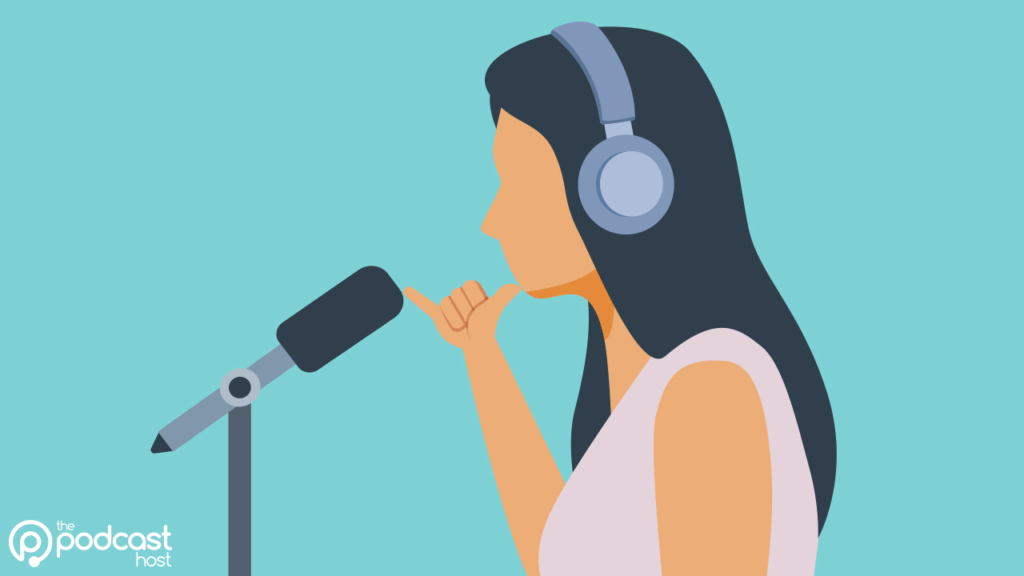9 Common Podcasting Mistakes & How to Avoid Them

Podcasting makes it easy to have your voice heard around the world: that is, easier than producing radio, television, or movies. It’s not hard to make a podcast. Making a good podcast, however, is not easy. Here are nine common podcasting mistakes: think of this as a map to the traps that many podcasters tend to fall into, so you can avoid them.
1. Prioritizing Enthusiasm Over Self-Awareness or Preparation
Some people will spend a lot of money on podcasting gear before they know what they want to make a podcast about. Others will hit record and talk for twenty minutes before they know who they’re talking to.
Lack of planning and self-awareness is an umbrella that all the other common podcasting mistakes shelter under. But you can plan ahead and learn to see yourself and your podcast objectively. You’ll see how that works in the next few sections.
2. Lack of Objective Audio Consumption
If you understand the expression “looking through rose-colored glasses,” then you’ll know what I mean when I say that some people are listening through rose-colored headphones.
Many people listen to their own audio and don’t notice simple mistakes, such as mouth noises, background noise, or over-compression. But, these mistakes can be jarring enough to make an audience stop listening.
NPR has an ear training guide for audio producers. This guide not only helps you know what kind of sound is distracting but also shows you how to describe it, so you can learn how to fix it. NPR’s quiz, “Do you have the ears of an audio producer?” is fun and interesting to try out, too.
Mic technique is more important than anyone realizes. The distance between your microphone and your mouth matters. It’s a common podcasting mistake to get too close so that your plosives puff in the audience’s ears. I can’t tell you how many times I’ve started listening to a sleep podcast, where the speaker tries to make a soft, cozy voice, cuddles up to their mic, and wakes me up with those airy consonants.

Recording with headphones on helps you hear what your mic picks up, not what you think you sound like.
Listen to a lot of different kinds of podcasts before you start producing your own. If you usually listen to interview shows, try a solo show or panel discussion, and vice versa. Try shows that experiment with sound or push boundaries, like The Kitchen Sisters or Sound School Podcast. The more you know about what a podcast can be, the easier it is to try new tactics when obstacles come up.
3. Expecting Perfection, Quickly
Another common podcasting mistake is to expect your podcast to be perfect, immediately. But, perfectionism can keep you from ever hitting publish and moving on to the next episode.
Before you start recording your episodes, take time to play with the software. Let yourself play with recording and editing. Experiment with your mic technique. Make an episode zero. Play is what helps us enjoy learning how to do something new.
Once you’ve gained confidence, level up and start recording the audio you want to publish. Then, you won’t be dismayed if something happens, like a power outage or a mean review. You’ll shift gears and try something different, or keep pushing through.
Your podcast doesn’t have to be perfect. What’s “pretty good” to you could be “just right” to your audience.
4. No Specific Topic
Search on Google for “a podcast about whatever.” You’ll find more shows than you’d expect. It’s amazing how many podcasts launch without a clear topic. Maybe they claim to be about “life and relationships,” “movies and pop culture,” or “Suzi and her friends talking about stuff.” These shows tend to have inconsistent publishing schedules. Often, there’s an episode with the creators announcing a hiatus while they plan future episodes.
Broad, vague podcast topics are a common podcasting mistake. It’s hard for an audience to care about a podcast and come back for more when it could be about anything. And it’s hard for podcasters to keep working on something that’s unrewarding and not paying off.
When a podcast explores a specific topic, the podcaster learns something, the audience knows what to expect, and it’s easy for them to share the show with others and respond to the show. But, when a podcast is vague, scraping up enthusiasm is unsustainable.
5. Not Knowing Your Audience
Many podcasters, especially when they’re first starting out, don’t know who their ideal audience is. They want as many people as possible to listen, so they say their podcast is for “everyone.”
When you make your podcast for a specific audience, they’re more likely to keep listening and share it with their friends. Knowing what your audience wants can help you build a relationship with them.
It’s one thing to have a podcast about “baseball memorabilia” and another to have “baseball card collecting for women who are fans of Japanese baseball.” That informs who you choose as guests, what events you promote or partner with, or where you promote your show.
Every year, reports surveying podcast listener demographics fly out into the world, and these genuinely help podcasters. However, asking your audience what they think makes them feel valued. It’s one thing to know that “Gen Z listeners appreciate funny real-life stories,” and another to know, “my audience wants me to tell them about my experience negotiating good vintage baseball card trades at swap meets.”
Try running an audience survey or ask questions they can answer with a voice memo. Pay attention to what they tell you, and how. Thank them for getting in touch.
Take the extra time and make the effort to get to know who’s listening and why. Then, tailor your content accordingly.
6. Lack of Preparation
Even the most casual-sounding podcasts are the result of forethought and advance work. A podcast host might sound as though they’re saying whatever comes to mind, but they’ve written an invisible script. It’s a common mistake for podcasters to expect inspiration to drop by every time they need to record a new episode.
When you plan out episode topics and talking points ahead of time, you can sound great even when you don’t feel inspired.
7. Aggressive Sales Tactics
Monetization makes it possible for podcasters to pay their podcasting expenses. It’s a fact of life. But, a common podcasting mistake is to give monetization too much space in your podcast.
A recent study by Ad Results Media examined how many ads are optimal, or make listeners stop paying attention. Apparently, two is the maximum number of ads in a row that most listeners will tolerate.
Ads that don’t match the audience or the content are irritating. Recently, someone told me she doesn’t like podcasts (in general) because she doesn’t like ads for sports betting services. But she hadn’t listened to podcasts about sports or gambling.
Host-read ads outperform dynamic ads because they build on trust. But, some podcast hosts slip sales talk into conversation whether it’s appropriate or not. Exploiting the trust your audience invests is a big turnoff.
Letting a monetization scheme have too much control over content is a common podcasting mistake. When your monetization scheme doesn’t help your audience, it undermines your relationship with them. It distracts the audience from your podcast’s message. And you know how easy it is for them to choose a different show. But, when your monetization matches what your audience needs and wants, both you and the audience benefit.
8. Long-Winded Introductions with Unrelated Information
When I start listening to a podcast episode, I know what I came for, and that’s what I hope to get. If the hosts spend a lot of time talking about what they did last weekend or the latest episode of a favorite TV show, this puts a block between me and what I came to hear. Some podcast hosts feel like this humanizes them and makes them approachable. But it’s a common podcasting mistake to have too long of a warmup before getting into the topic at hand.
If you must have opening business, use chapter markers in your show notes. That way, I know I can skip the deep dive into a 2015 episode of Downton Abbey. For more on this, here are some tips on introducing your podcast episodes.
9. Episode Titles and Descriptions that Don’t Show Us What’s Inside
Often, when I read descriptions of newly launched podcasts, I find myself like Brad Pitt in the climax of the movie Seven. I feel like I’m standing alone in a desert, screaming, “What’s in the box?” Episode descriptions that are poetically vague are common podcasting mistakes. Another is to tell me who made the podcast and how successful they are, instead of the content in the episode.
You don’t have to spoil it for me. Instead, tell me what the people in the episode want to do, how they plan to do it, and what’s in their way. Instead of, “We interview Stephen King, who has sold over a zillion books, about productivity,” something like “Stephen King, eclectic horror writer, shows us how he outlines a new chapter”, gives me just enough specificity to pique my interest.
We All Make Mistakes. This Is How We Learn
If you do anything new or challenging, then it’s impossible not to make mistakes. But hopefully, this guide can help you learn from the common podcasting mistakes of others so that you can avoid having to make quite so many yourself.
As for the odd occasion where you don’t quite get something right, see it as an opportunity for learning and growth. You’ll always come through stronger and wiser on the other side. In our IndiePod Community, you’ll find thousands of creators in the same boat as yourself. It’s a brilliant place to swap stories, get or give help, and celebrate wins together. It’d be nice to see you in there.
